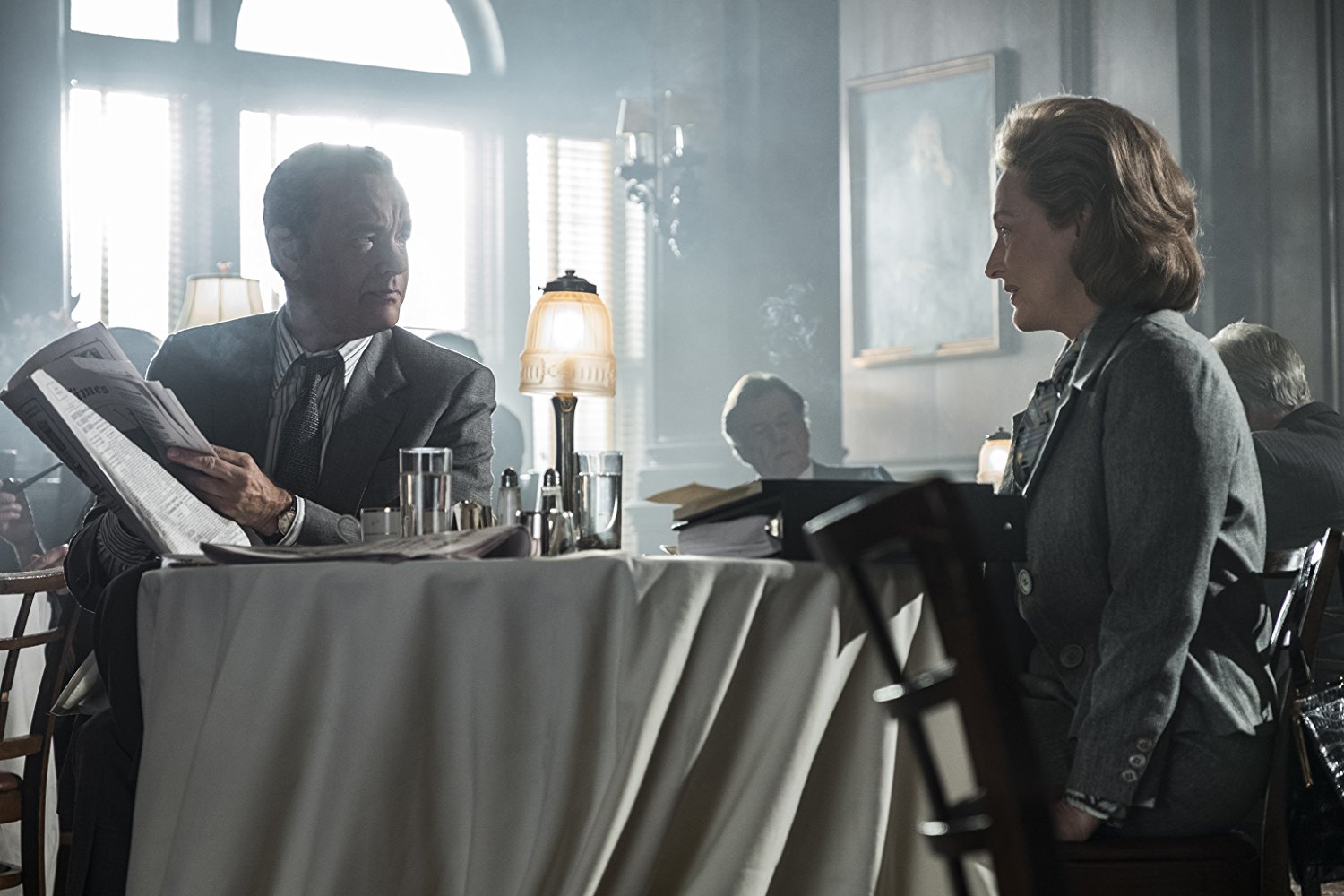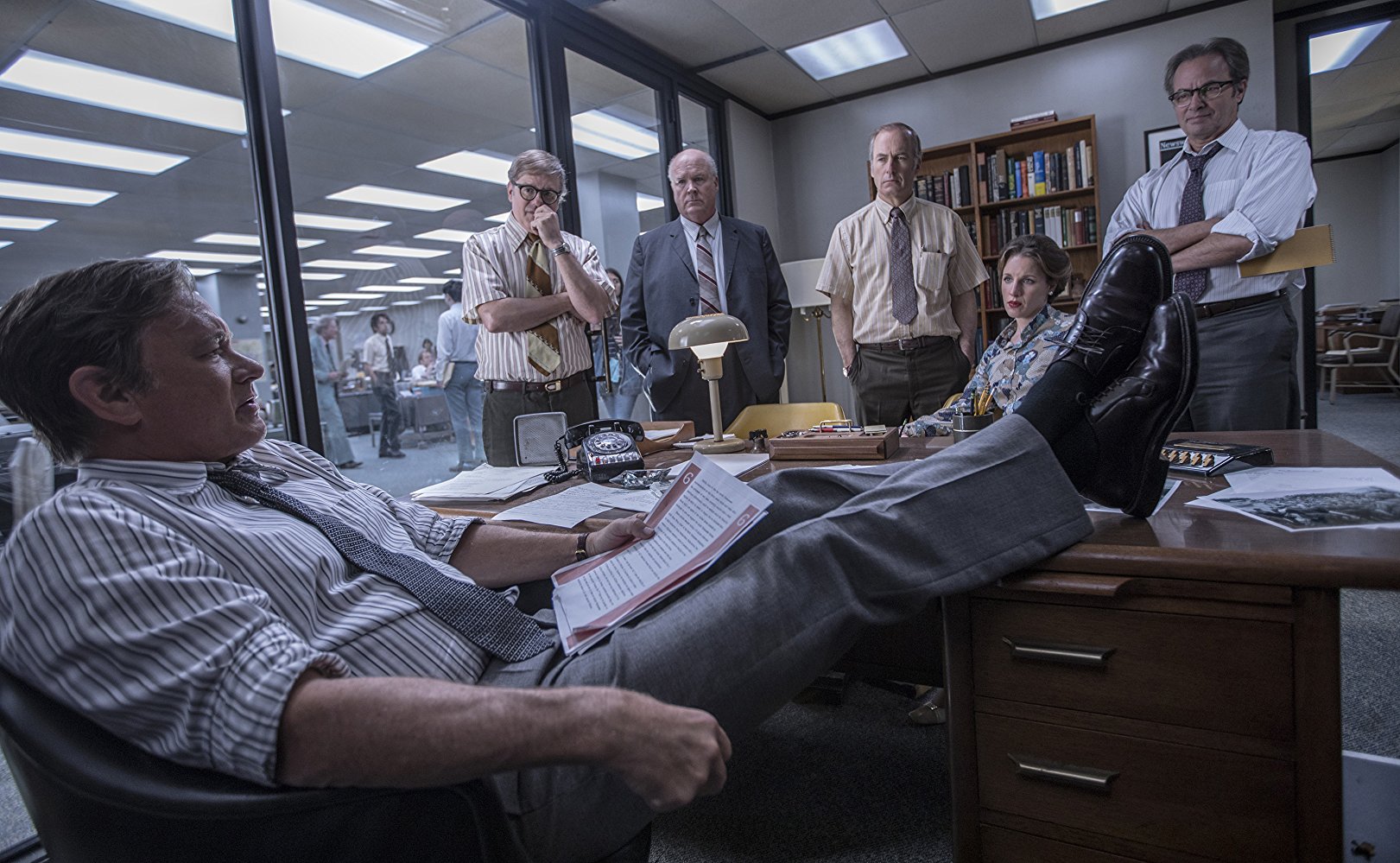Deja vu.
I’ve tried to keep politics out of my reviews, with the exception of an occasional swipe or two. I have very strong opinions, especially in our current situation, but I know that’s not why you come here. You just want to know how a movie was and, hopefully, laugh at my jokes and nod in agreement. With The Post, that won’t be possible because the entire movie is literally about politics and news media. So, you have a choice – buckle up or jump out of the car because we’re going off-roading with this one.
The Post is about the decision by the Washington Post to publish the Pentagon Papers. What are the Pentagon Papers? Glad you asked. During the height of the Vietnam War, the Pentagon commissioned a Top Secret study of the United States’ political and military involvement in Vietnam covering 1945 to 1967. You read that right – we were screwing around with Vietnam practically before the ink had dried on the Japanese articles of surrender ending WWII. The study documented all of the activities, including all of the secret missions into neighboring countries and the true rationale for fighting the war. The report demonstrated that four administrations (Truman, Eisenhower, Kennedy, and Johnson) were lying to the public regarding their intentions. If you want to know more, the entire report has been declassified and you can read the 3,000+ pages at your leisure.

Read all about it.
The report was completed in 1969 and Daniel Ellsberg, who worked on the study, leaked it to the New York Times and Washington Post. The film takes place in 1971 and kicks off with Ellsberg (Matthew Rhys) making his decision after hearing Secretary of State Robert McNamara (Bruce Greenwood) lie his ass off to a gaggle of reporters about the war progress. Ellsberg meets with some people to make copies of the classified text, then we cut away to Kate Graham (Meryl Streep) and Ben Bradlee (Tom Hanks), the publisher and editor of the Washington Post, respectively, discussing newspaper stuff, including always being two steps behind the New York Times. The first half of the film does a great job of building up the Post as a local paper trying to get called up the big leagues. They are also grappling with being on President Nixon’s bad side for an unflattering piece about his family and having a female publisher (owner of the paper) in 1971, so you really get a sense that they need a big win and you will root for them to succeed because you’re not a chauvinist or right-wing nut-job screaming “fake news.”

Can you believe these assholes?
The tension builds as Bradlee suspects the Times is about to publish something huge, eventually proven correct. Bradlee is desperate to get his hands on a copy of the report and the second act of the film covers their search while trying not to cry over the New York Times spanking them every day. Luckily for them, Nixon and his appointees were various levels of horrible and the Justice Department filed injunctions to stop the Times from publishing any more of the report, citing national security and classified documents, etc. At this point, arguably the best scene of the film occurs, featuring Ben Bakdikian (Bob Odenkirk). Bakdikian meets with Ellsberg and the look on his face as he is hit with the reality of the situation is gold. But that’s nothing compared to the flight home (which I won’t spoil for you). Up to this point, the entire movie has been meticulously building to an all-night session at Bradlee’s house where Bradlee and a bunch of reporters pour through documents to find pieces to publish before the printing deadline. The tension climaxes as a bunch of suits try to pressure Graham not to approve publishing in light of the lawsuit against the Times.
What I love about this movie is that director Steven Spielberg and writers Liz Hannah and Josh Singer convince you that Graham might not allow publishing, even though we live in 2017 and you could easily Google what happened. It’s filmmaking at its finest and I couldn’t have been more pleased. In addition to the tension, the actors all crush their roles to the point that you see their characters and not Tom Hanks and Meryl Streep. As weak as I am at judging performances, when actors of that stature make you forget they are them, I know I’m seeing great performances. I also just love historical biopics teaching me about things I didn’t know before. The decision to focus on the journalism instead of the report itself meant filling in a facet of the story that doesn’t get much focus. The final note regarding that was the Supreme Court sided with the Times, reaffirming that the first amendment is important, the American public’s awareness of such important matters is doubly important, and classifying something because it contains embarrassing information and details illegal acts violates the very trust we place in our government officials. Which brings us to our current President and today’s Republican Party.

The first amendment is first for a reason.
As we were giving our opinions after the film, one gentlemen expressed that the timing of this film is a little suspicious. That is a strange way to ding a film, considering that Hollywood always tried to incorporate relevant current events. Like Nixon (the film is sprinkled with Nixon fuming at the press), Donald Trump has a special hatred for anyone in the media (really, just anyone) that doesn’t want to ram their heads up his ass like Fox News. Rarely a day goes by that the right isn’t shrieking about the “biased, liberal, main-stream media” because that same “liberal” media has the audacity to report on facts about the horrible people occupying the right and the horrific things they are doing, trying to do, or have already done. The entire point of this film is to remind us that the first amendment is the most important freedom we have and that the press has an obligation to hold elected officials accountable to keep them from making decisions that are not in the best interests of the country (you know, like their current tax cuts for millionaires and trying to wreck the entire healthcare system). Fox News forgot that obligation a long time ago when they decided to be nothing more than a paranoid mouthpiece for rich Republican donors and peddle conspiracy theories and bullshit to their ignorant audience. Yes, there are left-leaning outlets that should also be ignored (sorry Occupy Democrats and Mother Jones), but if you are listening to Trump and which news outlets he says should be trusted, just do the opposite. Trump’s constant attacks on the media are exactly what Nixon did because both of them are world-class narcissists. Now I’ll take a breath.
If there’s anything you should take away from this film it is that we need media scrutiny of the government as much now (if not more) than 45 years ago. The Washington Post and the New York Times are not the enemy of the right (there’s that shrieking again), they are the defenders of the people of this country. The Post tells us that story and reminds us that the worst case scenario of a discarded free press are your children dead in some shitty country on the other side of the world because some asshole(s) think being President makes them king.
Rating: Don’t ask for any money back because we all just got tax breaks. Just kidding, you didn’t because you’re not rich.